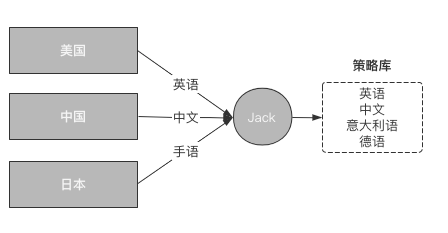23、Python - 策略模式
基本介绍
策略模式(Strategy Pattern)中,一个类的行为或其算法可以在运行时更改。
也就是说该类在不同的环境下,能够调用不同的策略算法。
特点:定义一系列的算法,把它们一个个封装起来, 并且使它们可相互替换
该模式属于行为型模式。
案例图示
如一个人旅游时,当他身在不同的国家中便要说不同的语言:

优缺点
优点:
- 算法可以自由切换
- 避免使用多重条件判断
- 扩展性良好
缺点:
- 策略类会增多
- 所有策略类都需要对外暴露
代码实现
用Python实现策略模式:
# 人
class People(object):
def __init__(self):
self.strategy = {}
def get_strategy(self, location):
strategy = self.strategy.get(location)
if strategy:
return strategy()
else:
raise AttributeError("不会这个位置的语言")
def register_strategy(self, location, strategy):
self.strategy[location] = strategy
# 策略类
class Strategy(object):
@staticmethod
def speak_english():
return "说英文"
@staticmethod
def speak_chinese():
return "说中文"
# 位置
class Location(object):
def __init__(self, location):
self.location = location
if __name__ == '__main__':
person = People()
location = Location("美国")
注册地理位置的策略
person.register_strategy(location.location, Strategy.speak_english)
获取在美国的策略
print(person.get_strategy("美国"))
location = Location("中国")
注册地理位置的策略
person.register_strategy(location.location, Strategy.speak_chinese)
获取在中国的策略
print(person.get_strategy("中国"))
# 说英文
# 说中文